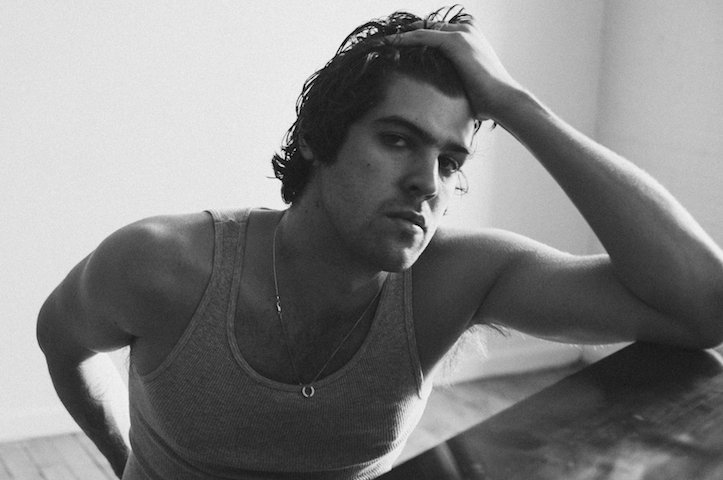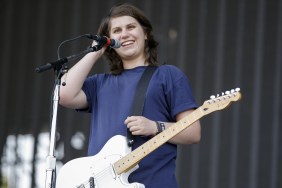Fresh off the jet and en route to his Melbourne accommodation Cameron Avery intones his words with a cool sense of relaxed ease. Despite lending his talents to Tame Impala, Pond and an almost dizzying array of other projects in addition to his own solo work, the laid back Avery shows little sign of being wearied. Perhaps there’s a little less weight on his shoulders. The two-year process of creating this latest album, he says, has been a cathartic one.
Far from the hard rocking gospel blues of The Growl, the forthcoming Ripe Dreams, Pipe Dreams sees Avery ply himself as a songwriter like never before. Crafting a sweepingly cinematic sound laced with baroque and symphonic elements, leading singles ‘C’est Toi’ and ‘Wasted on Fidelity’ swim with earnest lyrics and lovesick devotion. They suggest that this new LP may only be tied to his previous output by scantly more than the common thread of his deep and husky vocals.
Ahead of his latest LP we caught up with Avery to delve into his newfound musical direction, his most underrated tracks and why the much touted Tame Impala hiatus might be more than just a little overblown.
Music Feeds: After more than a year of touring on and off with Tame Impala following 2015’s Currents, your upcoming Laneway Festival performances might be the last we’ll be seeing of the group for a while. How are you feeling?
Cam Avery: Um yeah, fine man. I don’t know if you would say that we’re going to be stopping playing for a while. I don’t know though. We just play when we play. There’s been loads of talk of this entire “hiatus”, but I don’t think it’s much of a thing. It’s fairly false, we’re playing in July! We might even play some more before then if it’s offered to us.
MF: Relative to the fevered blues of The Growl, the fuzzed out riffs of Allbrook/Avery and the psychedelic sounds of Pond, the baroque pop style of your debut LP Ripe Dreams, Pipe Dreams seems to take things in a little bit of a different direction. What is it that drew you to this new style?
CA: It’s more of an old style. It’s the music I grew up listening to: big band, jazz and that sort of music. It’s just me coming back around and admitting to myself that that’s my music. It’s sort of me humouring myself a bit more with the stuff I really like rather than trying to overthink it too much. I’ve been writing a lot more on piano and the songs sort of took on this songwriting-composition style rather than the soundscaping type stuff I’ve done with other bands. It was sort of just letting the songs come out as they did. It was over two and a half years that I was doing this record and it was more of a catharsis like thing for me. It started off as a Growl album, but then more and more it became something else. I changed the name out of necessity, I started letting go a little more of any preconceived ideas of what the album was going to be.
MF: It’s quite a grand style of music, loads of studio embellishment. You’ve got things like strings and timpani, the whole hog. How are you approaching the new songs live?
CA: I see a live show as a completely different thing to a recording. Recording, you’re creating. Playing live is more, I don’t know, there’s so many more aspects. Playing live there’s people there looking at you. I pull the songs apart and try to cater to playing them live, creating moments in the live show rather than off the album. I definitely play them differently. They’re more spare and stripped back. There’s probably more focus on the lyrics rather than the entire production.
MF: So for you, there’s the performance thing and then recording is more of an area of artistic exploration…
CA: Yeah, I think that’s what all recording is. You’re going inward. It’s so much more about you. Well at least for me personally. I know other people make songs with the intention to sell a million records or with an audience in mind, but for me it’s always really personal.
MF: There are these really personal songs on the album; it often touches on those archetypical musical themes of love, longing and devotion. Is your songwriting a reflection of what’s been going on in your own life during these past two years?
CA: Yeah, I’ve definitely started writing in a less metaphorical way. Like I said, the songs were never intended to be, as they stand now, a conceptual album or diary about what’s happened to me. But as I worked on them more and more Jody, my manager, told me that the songs were really great and that I should put them all onto a record. It was then that I started thinking of the whole narrative. It’s nearly in chronological order in terms of exactly what’s happened and how it happened.
MF: Some songwriters get apprehensive about putting too much of themselves into their music. Was that something you were concerned about?
CA: As I got later into recording the songs, it got a little bit to this point where I couldn’t help but think “Shit! What are all these people going to think of this stuff?” It’s like a very expensive journal entry. But these songs feel good to play! I’m a big philosopher on why I do something. What it is and how you do it are two distinct things. For me, the why has become a more philosophical idea. It was very much a personal project and hence why we ended up changing the name. It became so far away from The Growl, it became such a solo mission. I wasn’t really showing any people the songs while I was working on them for obvious reasons, like being in relationships and things like that. So I really just looked inwards. It was pretty personal but it was also a big release for me, getting these songs down and feeling that the album is a part of me. It makes it better to perform live, because you can’t fake it you know? If that’s what happened you can’t really fake that.
MF: Relocating from the sleepy city of Perth, you’ve also spent the last few years based in the U.S. As a musician how are you are finding the culture of their big cities relative to Australia’s big musical hubs of Sydney and Melbourne? Has it fed you creatively?
CA: I keep to quite a small group of friends in America. I’ve been living in New York for the last six months now, but while making this album I was based in Las Angeles. LA and New York are different beasts to the rest of America. There are so many bands and artists. Because we all know it as the “Land of Opportunity” there’s so many people trying to do something. You have to kind of be pretty good to get a gig. Just to watch the bands, the level of musicianship is really high. Like in LA [legendary session musicians] The Wrecking Crew, the calibre of musicians that I’ve met that aspire to be like Jim Gordon, Jim Keltner or anyone in the Wrecking Crew that played on all those amazing records during the ’60s and ’70s, it’s something I’ve never encountered before. They’re everyday casual sort of dudes, but they can just play! A good example is the guys who played the strings on my new album, most of those strings were done in one take. There are 16 players and all of a sudden in four and a half minutes you’ve got strings on your album! You put the charts in front of them and they just play it.
The infrastructure in Hollywood is amazing to be around as well. There are all these amazing sound stages. Some of the strings on my album were done in the same space where they recorded the soundtrack for Alfred Hitchcock’s Psycho. Some of the history within those rooms is just incredible. It does inspire you a lot and for me it dictated the sonic landscape of the album. But then what I feel is great about Australia is that there’s definitely a lot more home recording and DIY stuff.
MF: You’ve supported Father John Misty (Josh Tilman) on tour and shortly after your own Australian tour you’ll be back on the road with him again in the U.S. Your music isn’t exactly alike but looking at it more broadly it certainly feels like there’s a shared affinity. What’s your relationship with Josh?
CA: He’s a good friend of mine. Being around him and seeing how he works, his attention to detail is definitely something. But I have the same feeling whether it’s Kevin [Parker] or other friends of mine who are musicians. I get inspired a lot by my peers. Not so much in a sonic way, although obviously Josh and I appreciate a lot of the same things as opposed to Alex Turner or Kevin Parker. Josh is great to be around. I truly think he’ll go down as one of the best songwriters of our generation. He’s fun to talk to about songs and a good voicing board for me as well, I send him songs and he sends me stuff. It’s more on this personal level rather than me hearing him and being like “I want to make songs like that!” He’s just a good friend to me.
MF: Of all your projects is there any one song or album that you think might be little underrated or overlooked?
CA: Oh woah! I don’t know! An overlooked thing from any of the bands that I’ve ever been in…
MF: A hidden gem or maybe something that hasn’t fired off in the way you might have expected.
CA: I don’t know! I can’t really think of it off the top of my head. I’m trying to think of a Tame song I really appreciated but never saw as much attention, but I don’t know! I think some of Nick Allbrook’s songs on Pond’s Man it Feels Like Space Again album weren’t… I like that song ‘Heroic Shart’, in fact, that whole album. I’ll say that, Man it Feels Like Space Again I thought would go a lot more gangbusters than it did. I think the songwriting on that entire album is incredible. You can hear the personalities of Jay’s songs, Jamie’s songs, Joe’s songs and Nick’s songs and they’re all so uniquely recorded. I thought it was a very idiosyncratic album which would get a lot more attention than it did.
–
‘Ripe Dreams, Pipe Dreams’ is out this Friday, 10th March.












